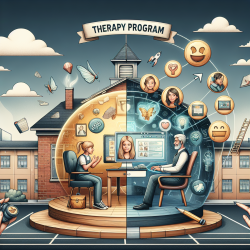As practitioners in the field of speech-language pathology, it is crucial to stay informed about evidence-based practices that enhance both learning and inclusion for students with special needs. A recent study titled "Dialogic Learning Environments That Enhance Instrumental Learning and Inclusion of Students With Special Needs in Secondary Education" offers valuable insights into effective strategies for creating inclusive educational environments. This blog will summarize the key findings and provide actionable steps for implementing these strategies in your practice.
Key Findings
The study, conducted in a secondary school in the Valencian Community of Spain, identified three educational strategies that significantly improved both instrumental learning and inclusion for students with special needs:
- Co-Teaching: Involves pairing a general education teacher with a special education teacher to facilitate a more inclusive learning environment.
- Interactive Groups: Small, heterogeneous groups of students work together on tasks with the facilitation of an adult, promoting peer interactions and collaborative learning.
- Dialogic Literary Gatherings: Students engage in discussions about classic literature, fostering deeper understanding and inclusive dialogue.
Implementation Strategies
Here are some actionable steps for practitioners to implement these strategies:
- Adopt Co-Teaching Models: Pair up with general education teachers to co-plan and co-teach lessons. This not only supports students with special needs but also enriches the learning experience for all students.
- Facilitate Interactive Groups: Organize students into small, diverse groups and rotate adults (teachers, parents, community volunteers) to facilitate group activities. This promotes peer support and enhances social interactions.
- Conduct Dialogic Literary Gatherings: Select pieces of classic literature and encourage students to discuss and share their interpretations. This not only improves literacy skills but also fosters a sense of community and inclusion.
Encouraging Further Research
While these strategies have shown promising results, it is essential to continue researching and refining these approaches. Practitioners are encouraged to collaborate with researchers, share their experiences, and contribute to the growing body of evidence supporting inclusive education.
To read the original research paper, please follow this link: Dialogic Learning Environments That Enhance Instrumental Learning and Inclusion of Students With Special Needs in Secondary Education.










